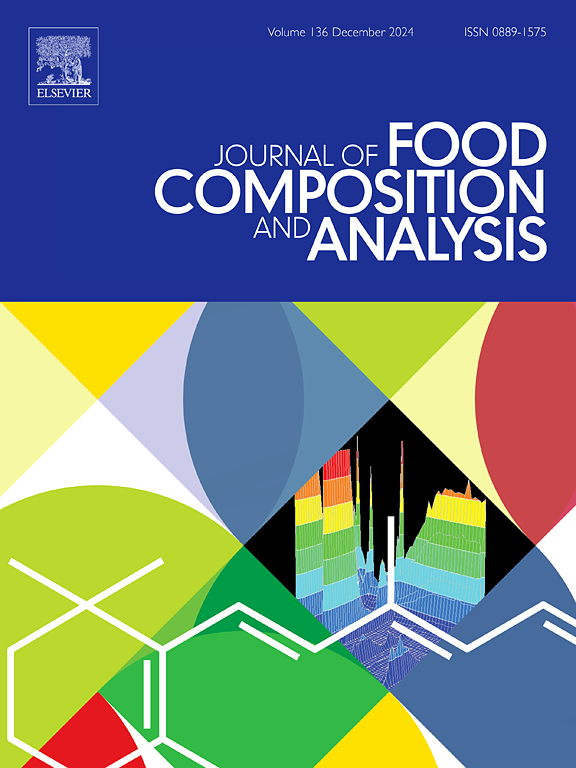从田间到餐桌辣椒中百菌清、虫螨腈和苯醚甲环唑残留的消散、加工因素和风险评估
IF 4.6
2区 农林科学
Q2 CHEMISTRY, APPLIED
引用次数: 0
摘要
了解百菌清、虫螨腈和苯醚甲环唑在辣椒中的残留情况对于保障食品安全和人类健康至关重要。在此,我们对辣椒中百菌清、氯虫苯甲酰胺和苯醚甲环唑从田间到餐桌的消散、清除和风险评估进行了系统研究。在田间试验中,百菌清、虫螨腈和苯醚甲环唑在辣椒中的消散遵循一阶动力学,半衰期分别为 6.80 天、9.00 天和 21.00 天。辣椒中还检测到了代谢物残留,包括 4-hydroxychlorothalonil (SDS-3701)、tralopyril 和 difenoconazole-alcohol(CGA205375)。腌制辣椒和辣椒酱在清洗、盐渍和发酵过程中的加工因子(PFs)为 1,整个过程的加工因子为 0.10-0.93。慢性、急性和累积风险评估表明,从膳食中接触百菌清、SDS-3701、氯虫苯甲酰胺、苯醚甲环唑和 CGA205375 在辣椒消费的可接受范围内。不过,百菌清和苯醚甲环唑的总膳食风险令人担忧,风险商数(RQ)分别为 162 % 和 140 %。研究结果可指导在农业中安全合理地使用百菌清、氯虫苯甲酰胺和苯醚甲环唑,并为评估辣椒产品中的残留水平提供参考。本文章由计算机程序翻译,如有差异,请以英文原文为准。
Dissipation, processing factors and risk assessment of chlorothalonil, chlorfenapyr and difenoconazole residues in chilli peppers from field to table
Understanding the residue fates of chlorothalonil, chlorfenapyr and difenoconazole in chilli peppers is essential for safeguarding food safety and human health. Here, the dissipation, removal and risk assessment of chlorothalonil, chlorfenapyr and difenoconazole in chilli peppers from field to table were systematically investigated. In field trials, the dissipation of chlorothalonil, chlorfenapyr and difenoconazole followed the first-order kinetics in chilli peppers, with half-lives of 6.80, 9.00 and 21.00 days, respectively. Residues of the metabolites, including 4-hydroxychlorothalonil (SDS-3701), tralopyril and difenoconazole–alcohol (CGA205375), were also detected in chilli peppers. The processing factors (PFs) in pickled chilli and chilli paste for washing, salting and fermentation were <1, with the overall process having PFs of 0.10–0.93. Chronic, acute and cumulative risk assessments indicated that dietary exposure to chlorothalonil, SDS-3701, chlorfenapyr, difenoconazole and CGA205375 was within acceptable limits of chilli pepper consumption. However, the total dietary risk of chlorothalonil and difenoconazole was alarming, with risk quotients (RQs) of 162 % and 140 %, respectively. The results could guide the safe and reasonable use of chlorothalonil, chlorfenapyr and difenoconazole in agriculture, as well as provide reference for assessing their residue levels in chilli products.
求助全文
通过发布文献求助,成功后即可免费获取论文全文。
去求助
来源期刊

Journal of Food Composition and Analysis
工程技术-食品科技
CiteScore
6.20
自引率
11.60%
发文量
601
审稿时长
53 days
期刊介绍:
The Journal of Food Composition and Analysis publishes manuscripts on scientific aspects of data on the chemical composition of human foods, with particular emphasis on actual data on composition of foods; analytical methods; studies on the manipulation, storage, distribution and use of food composition data; and studies on the statistics, use and distribution of such data and data systems. The Journal''s basis is nutrient composition, with increasing emphasis on bioactive non-nutrient and anti-nutrient components. Papers must provide sufficient description of the food samples, analytical methods, quality control procedures and statistical treatments of the data to permit the end users of the food composition data to evaluate the appropriateness of such data in their projects.
The Journal does not publish papers on: microbiological compounds; sensory quality; aromatics/volatiles in food and wine; essential oils; organoleptic characteristics of food; physical properties; or clinical papers and pharmacology-related papers.
 求助内容:
求助内容: 应助结果提醒方式:
应助结果提醒方式:


